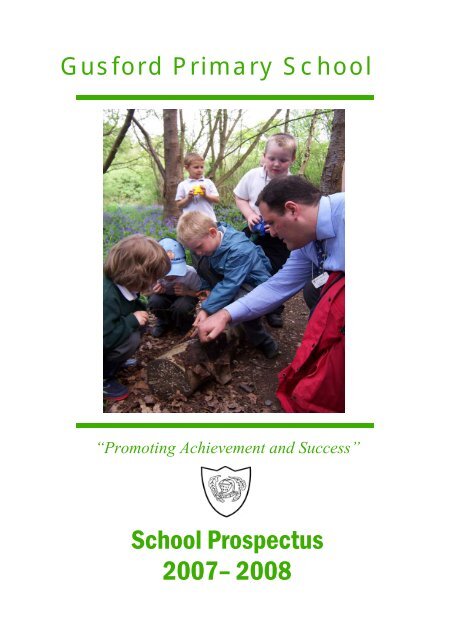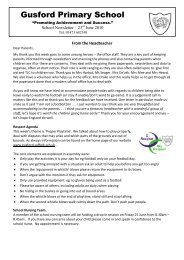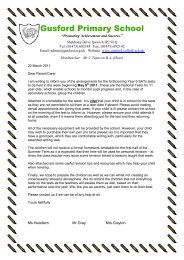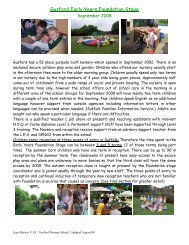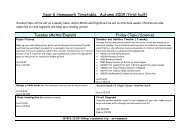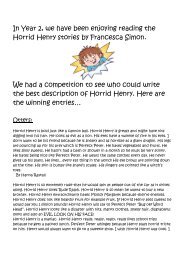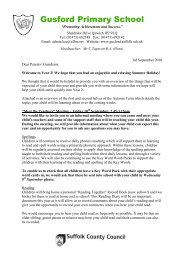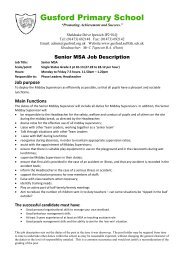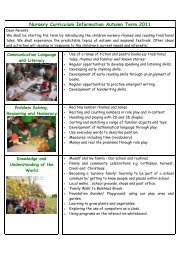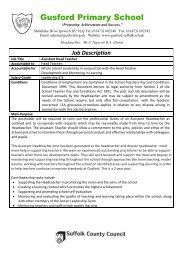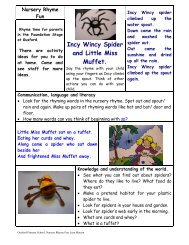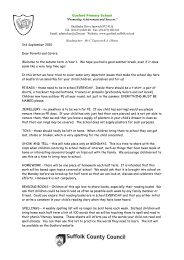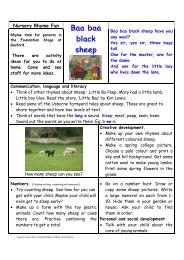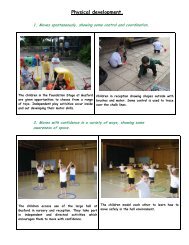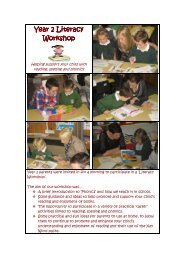Prospectus - Gusford Primary School
Prospectus - Gusford Primary School
Prospectus - Gusford Primary School
You also want an ePaper? Increase the reach of your titles
YUMPU automatically turns print PDFs into web optimized ePapers that Google loves.
<strong>Gusford</strong> <strong>Primary</strong> <strong>School</strong>“Promoting Achievement and Success”<strong>School</strong> <strong>Prospectus</strong>2007– 2008
CONTENTSContents .............................................................................. Page 1Headteacher’s welcome ..................................................... Page 2Aims of the <strong>School</strong> ............................................................. Page 3<strong>School</strong>s Hours ..................................................................... Page 4Organisation of Classes ...................................................... Page 5Nursery Classes .................................................................. Page 5<strong>School</strong> Uniform .................................................................. Page 6Lost Property ...................................................................... Page 7PE & Sports Clothing ......................................................... Page 7<strong>School</strong> Meals ...................................................................... Page 8Home <strong>School</strong> Links ............................................................ Page 9Communicating with the <strong>School</strong> ........................................ Page 9Making Appointments......................................................... Page 9Medical Arrangements ..................................................... Page 10Accidents & Illnesses in <strong>School</strong> ....................................... Page 11The <strong>School</strong> Curriculum .................................................... Page 12English .............................................................................. Page 12Mathematics ..................................................................... Page 12ICT ................................................................................... Page 12Science ........................................................................... . Page 12Music ................................................................................ Page 13Religious Education ......................................................... Page 13Assemblies ....................................................................... Page 13Sporting Aims .................................................................. Page 13<strong>School</strong> Clubs .................................................................... Page 14Special Needs ................................................................... Page 14Behaviour ................................................................................. Page 15<strong>School</strong> Values .......................................................................... Page 15Complaints Procedure ...................................................... Page 16Sex Education ................................................................... Page 16Homework ........................................................................ Page 16Charging & Remissions Policy ........................................ Page 17Absence & Attendance ..................................................... Page 17National Curriculum Assessment Tests ........................... Page 18Target Setting ................................................................... Page 18<strong>School</strong> Governing Body ................................................... Page 19<strong>School</strong> Staff ...................................................................... Page 20Holiday Dates ................................................................... Page 201<strong>Gusford</strong> <strong>Primary</strong> <strong>School</strong>, Sheldrake Drive Ipswich IP2 9LQTelephone 01473 682148 Fax 01473 692142Email admin.kee@e2bn.net Website: www.gusford.suffolk.sch.ukHeadteacher Mr. Colin TapscottCommunity <strong>Primary</strong> <strong>School</strong> - Mixed Ability 5 to 11 and NurseryChair of Governors Mr Colin Fiske
WelcomeWelcome to <strong>Gusford</strong> <strong>Primary</strong> <strong>School</strong>. We hope that this will be the start ofa long and happy association. We are all very proud of our school and hopethat you will come to share that feeling with us. This prospectus tries to setout a glimpse of life at <strong>Gusford</strong>. This includes the activities andopportunities available to all children together with practical informationfor parents.2I joined <strong>Gusford</strong> in April 2007 and it became clear from early on that<strong>Gusford</strong> is a school with great potential. Staff, children and parents all worktogether to get the best for the children and for them to have a broad andbalanced curriculum and to enjoy learning. <strong>Gusford</strong> had its fair share ofsuccess in 2007 as district champions in cricket and mixed netball andacademic results that are improving.Enjoyment and ExcellenceI have always believed that children should enjoy learning and that their time at primary school should be atime that creates lasting happy memories. Hopefully as you look through our prospectus you will recognisethat <strong>Gusford</strong> is a place that creates those memories for our children because we try to bring learning alive.We have science days, sports tournaments & trophies and woodland walks which give a flavour of things thathappen at <strong>Gusford</strong>. Alongside this our aim is to help children achieve the best academic results.<strong>Gusford</strong> is a community primary school and our motto"Promoting Achievement & Success"means that alongside our learning we want to work with parents and members of the community to achievefor our children. Our aim is to get to know each other as well as possible so that your child can be educatedin a happy and stimulating environment based on friendship, co-operation and understanding. Pleaseremember that if you or your child have any concerns or worries at home or at school, however small, itwould help us to know about them.By working closely together we can build and maintain a school environment where consideration for othersand courtesy to all provide a firm foundation from which our children will be prepared to face life withconfidence in the twenty first century.Colin TapscottHeadteacher
Introducing <strong>Gusford</strong><strong>Gusford</strong> <strong>Primary</strong> <strong>School</strong> provides education for around 600 children aged from 4 to 11 years and is able tocater for an annual intake of up to 90 children. We are situated in the Chantry area of Ipswich. The school,which was opened in 1962, has 21 classrooms, 2 halls, a learner swimming pool, computer suite and anumber of group rooms and resource areas. The school serves the Brookwood, Thorrington Park, BelsteadHills and Chantry area of South West Ipswich. Details of the precise catchment area may be obtained fromthe school office. Currently there are more than 250 children attending from outside the catchment area.There are pleasant grounds with much landscaping around the site. There is also a beautiful environmentalarea with a pond and natural hedgerow which are used by the children as part of their studies.3Our AimsSAFE: Develop a safe community, where each childwill learn to share and live together, showing care andrespect for people and property.HEALTHY: Provide a curriculum which cover allareas of the Foundation Stage, Key Stage 1 and 2 thattakes account of the children’s interests. We will plan thecurriculum to include access for children of all abilities toextend them at their appropriate level and that promotesbasic skills and a healthy lifestyle.ENJOY & ACHIEVE: Develop resourcesand up-date areas of the curriculum regularly in order tocreate a stimulating environment that provides the best quality teaching and learning experiences possiblethat will enable children to enjoy and achieve.ECONOMIC WELLBEING: Ensure that the children are secure and happily settled intoschool so that they may develop to their full potential, confidently taking responsibility for their ownindependent learning and prepare them for their future well being.POSITIVE CONTRIBUTION: Encourage the involvement of the wider communitywhere governors, parents, children and staff, work together to make a positive contribution for the benefit ofall.
4Daily TimetableFor all the children, the hours of the morning session are the same,but in the afternoon the Key Stage 2 children work longer. Thetimes are:MORNINGAFTERNOONREC & KS18.50 am - 12.00 noonBREAK 10.40-10.55am1.10 pm – 3.20 pmBREAK 2.40-2.55pmKS28.50 am – 12.00 noonBREAK 10.40-10.55am1.10 pm – 3.30 pmThere is a break of 15 minutes during each morning for everyone but only the Reception and KeyStage 1 have a 15 minute break in the afternoon. For each full school week the time is spent asfollows:REC & KS1KS2Teaching Time (not21 hours 23 hours 30 minutesincluding Assemblies)Assemblies 1 hour 40 minutes 1 hour 40 minutes(25 mins collective worship) (25 mins collective worship)Registration 1 hour 30 minutes 1 hour 30 minutesBreaks 2 hours 30 minutes 1 hour 15 minutesChildren are not allowed onto the school premises before 8.35am unless they are involved inan official school practice or club. Children who go home for the mid-day meal are not expectedto return to school before 1.00pm.Teachers undertake supervision in the playground from approximately 8.40am. In the Receptionand Key Stage 1 the children line up in class groups ready to be taken in by their class teachers.Parents should say goodbye to their children outside so that they are ready to go into class at8.50am promptly. The main entry doors remain open for 10 minutes. Children who are morethan 10 minutes late for school must report to the main school office.
Organisation of ClassesWhen children join the school at the age of 5, they will normally be put in a class of receptionchildren of a similar age, or join a slightly older reception group. Usually at the end of thereception year the children are mixed with the other two termly intakes to form a mixed ability,mixed age year one. Sometimes the children stay in the same groups but are mixed at the end ofYear 1. In Year 2 to 6 it is expected that the children will be organised in mixed ability singleyear groups. No Reception and Key Stage 1 class will be allowed to have more than 30 pupils atthe start of the school year. This may mean that some year groups may need to be mixed infuture.The average class size in the school is around 27. There are setting groups for children inMathematics in years 2 to 6. The objective is to encourage these children to achieve the higherlevels in the National Curriculum totals. In years 3-5 there are support sets to provide anadditional boost for those children who need to study easier texts in English. For those childrenwho have greater difficulties the Special Needs Co-ordinator (SENCO) organises additionalgroup work and provide individual support programmes which are delivered by teachingassistants.NURSERY CLASSESThe school has a nursery, which opened in September2002. The nursery is located in a separate part of theschool and has its own fully enclosed play area.The nursery has 52 places - 26 in the morning and 26in the afternoon. It opens from 9.00-11.30 a.m. and1.00-3.30p.m.Parents are advised to fill in an application form soonafter their child’s second birthday. Children areusually offered 2 terms in the nursery before startingschool full time. However, places may be offered toyounger children if the nursery is not full. The nursery admission criteria are available from theschool office or from Suffolk County Council (<strong>School</strong>s in Suffolk booklet). Usually (providingspace and numbers allow) the younger children start in the afternoon and move to the morningfor the second term.The timetable for admissions is normally as followsChildren BornSeptember toDecemberChildren BornJanuary toAprilChildren BornMay to AugustStart <strong>School</strong>Beginning of theTerm in which childis 5 (September)Beginning of theTerm in which childis 5 (January)Beginning of theTerm in which childis 5 (April)Application for<strong>School</strong> place bySee <strong>School</strong>s in SuffolkBooklet, or enquire atschool officeSee <strong>School</strong>s in SuffolkBooklet, or enquire atschool officeSee <strong>School</strong>s in SuffolkBooklet, or enquire atschool officeLikely NurseryPlace AvailableJanuary after thechild is 4May after thechild is 4 (NBTerm usuallystarts in April)September afterthe child is 45Nursery PlacesAllocatedNovemberFebruaryProviding that parents ensure that their child is entered into the school’s admission book, theschool will ensure that application forms are sent out at the right time. Parents must notify theschool if there is a change of address thereafter.June
<strong>School</strong> UniformThere is a school uniform and all children who attend the school are expected to comply withthis. This policy was decided upon after 94% of parents voted in favour of a school uniform.6BOYSWINTERLong or short grey or black trousersWhite Polo T shirt or shirt withBottle green jumper, cardigan, sweatshirtor fleeceFlat solid black shoes or black trainersSUMMERContinue with the winter uniform or:(1) White shirt or Polo T shirt(2) Short sleeve shirt with short greytrousers or black / grey plain shortsGIRLSGrey or bottle green pinafore dress or skirtBlack or grey trousersWhite blouse or Polo T shirtBottle green jumper, cardigan, sweatshirtor fleeceFlat solid black shoes or black trainersContinue with the winter uniform or:(1) Plain style dress in green or checksor stripes(2) A white blouse or Polo T shirt withwinter skirt or trousersWhite sandals with a back strapAVAILABLE FROM THE OFFICE ON TUESDAY, WEDNESDAY AND THURSDAY:Fleece with embroidered badge from £12.00 Recorders £5.50Green Sweatshirts with embroidered badge from £11.50 Recorder Book 1 & 2 £3.50Polo Shirts with school badge from £7.50 Nursery T Shirt £4.50T Shirts with a school badge from £4.00 Long Sleeved<strong>School</strong> ties (recommended but optional) £2.00 Nursery T Shirt £7.50Caps with school badge £2.50Legionnaire caps with school badge £3.00Book bags with the school badge £2.50Gym bags with the school badge £2.50
Lost PropertyPlease mark your child’s name in all articles of clothingWe cannot accept responsibility for loss or damage of children’s property, but if items are clearlynamed we will do our best to return them to their owner. Parents are welcome to drop in toreclaim any lost items.Reception and Key Stage 1 lost property is stored in a bin outside Room 9, and Key Stage 2 lostproperty is in a bin in the Small Hall.Please make sure that your child is provided with a handkerchief or tissues before coming toschool.PE & sports ClothingChildren will need a variety of equipment, depending on the season:7INDOOR PEOUTDOOR PE• Plain white or blue T Shirt with• Plain black or blue shorts• A leotard or black or blue wrapover skirt may be worn by the girls ifpreferred• Leotards are not recommended for outdoor wear in winter• Key Stage 2 children require plimsolls or trainers which should bekept throughout the week with their PE kit in school• In winter children need a tracksuit or to change into warm clothingincluding a thick jumper• Children in Years 4, 5 and 6 are allowed to bring football bootsduring our football season if they wish• A change of socks is recommended for those children who have PElessons on the field in winter• In the Summer Term Reception and Key Stage 1 children alsoneed plimsolls or trainers for outdoor PE• In the Summer Term all children need a swimming costume, toweland swimming hatPlease ensure that ALL sports equipment ismarked with your child’s name.Earrings must be removed for all PElessons. It is the responsibility of each childto do this. If it is not possible to remove studsor sleepers, parents must provide stickingplaster to cover them so that there is no dangerto themselves or others during PE. Inswimming the only option is remove earrings.Please do not have your child’s ears piercedduring the Summer Term as this will preventyour child from joining in with swimminglessons.
8<strong>School</strong> MealsThe school kitchen, under the supervision of theCook, provides a meal on a cafeteria basis. Thecurrent prices (September 2007) are:Main Course and Sweet £1.80Milkshake £0.40Carton of Milk 0.18Orange drink £0.30A cashless cafeteria system is used. Parents and olderchildren pay money into a revaluation machinelocated in the front entrance. Each child has a PINnumber which has to be entered into the machine. Payment is made in advance for school meals.Parents can pay a week, month or a term in advance. Cheques are put into a special collectionbox and are made payable to ‘Suffolk County Council’ with the child’s name and class writtenclearly on the back.Packed LunchProvision is made for children to bring their own packed lunch, and water and glasses areprovided. Children who bring their own food may purchase drinks from the cash cafeteria.Children are not permitted (for safety reasons) to bring tins, glass bottles or fizzy drinks.Although the school does not insist that certain foods are bought, parents should be careful not tosend in large quantities of chocolate biscuits etc. Some children have suffered changes to theirbehaviour in the afternoon following the consumption of chocolate. Bars of chocolate and sweetsare not allowed for packed lunch.Nuts in Packed LunchesI am sure that many parents are aware that some children suffer extreme allergic reaction to nuts.This can result in death if airways are blocked as a result of swelling in the throat. Therefore, Irequest all parents not to put items containing nuts into their child’s packed lunches (egPeanut butter sandwiches, bags of peanuts or mixed nuts) As parents, I am sure you will see theimportance of ensuring the safety of all children in school.Parents are welcome to visit the school during the midday break to try a school meal and observethe arrangements. This should be organised by contacting the Headteacher.Free MealsIn certain cases free meals are available to children, (particularly parents in receipt of IncomeSupport or income based Job Seekers Allowance). Application forms and further details may beobtained from the <strong>School</strong> office.Break Time SnacksAs part of our approach to health education the school has adopted a healthy eating policy.Children are only allowed to bring in fresh fruit to eat during morning break time. This must bestored separately from packed lunch, as children are not allowed to access their packed lunch boxduring break time.
Home – <strong>School</strong> Links9The school tries to work closely with parents andthere are a number of ways of encouraging this. Wewelcome help from parents to assist with art andcraft, reading, swimming, cookery, repairing andcovering books, computer work, the library etc. Inaddition parents are often asked to help accompanythe children on class visits. Unfortunately, we arelimited in the number of people that we can ask atany one time and so it is difficult to avoiddisappointing some parents. Sometimes it can bebetter to help with a class which does not containyour child. This can be arranged throughdiscussion with your child’s teacher. Parent helpersare required to ‘sign in’ at the office before going to the classroom.Children need to feel that their parents and teachers have mutual respect. We endeavour topromote this relationship and hope that parents have similar aims. We believe that parents havean important part to play in their children’s education and interested parents contributeconsiderably to their child’s progress. The school has adopted a parent/school contract. This isgiven to all parents of children when they start the school and again when they transfer to KeyStage 2.Before your child starts school, and during the early part of each Autumn Term, we ask parents tocomplete a form giving the school certain information, in particular how to contact you in anemergency. Please make sure that this form is completed and returned and that the information isupdated as and when necessary (eg if you move house, or change your home or work telephonenumber etc). This information is vital if your child is ill or in an emergency situation.COMMUNICATION WITH THE SCHOOLGenerally communication with the teachers should be by letter as teaching commitments and thesize of the site make it difficult for them to come to the office telephone. Emergency messageswill of course be passed onto children or their teachers.The <strong>School</strong> Telephone number is 01473 682148If your child is absent you can leave a message on the answerphone to tell us why they are not inschool. The answerphone is on from 4:15pm to 8:30am.The Fax Number is 01473 692142Our Email address isadmin.kee@e2bn.netMAKING APPOINTMENTSIt is usually best to speak to teachers briefly before or after school if you have any concerns orneed to pass on information. If you need to discuss matters for a longer time or cannot see theteacher before or immediately after school, you need to contact the office staff to make anappointment. You should give them brief details of the problem so that the teacher caninvestigate specific incidents or have the right information to hand when you meet them.
Medical ArrangementsThe school nursing team will see your child withwritten consent during the second term, this willinclude hearing and vision concerns. If you wish tosee the school doctor, appointments can be arrangedthrough the school nurse who may refer your childfollowing discussion. Debbie Boother, can becontacted at Chantry Clinic (telephone no. 685964).If your child is absent from school, you need to senda note to the class teacher explaining the reason forabsence. Please telephone the school before 9:30amto tell us why they are absent. The answerphone is onfrom 4:15pm to 8:30am if you wish to leave amessage.In the interests of all, children who have been sickshould not return to school for at least 24 hours afterthe last bout of sickness.10Our school nurse, Debbie Boother, visiting thenursery for a healthy eating talk with herselection of fruit and vegetables.Head lice are sometimes a problem. Advice can be obtained from the <strong>School</strong> Nurse, GP orPharmacist. Please notify the school. A leaflet is available. The best method of prevention is tobrush and comb your child’s hair prior to bed time and regularly check his/her hair at least once aweek.Medical Appointments.It is expected that all children will be collected from school by their parents if they have to leaveschool during the day for a medical appointment or other reason. Children will only be releasedfrom school to walk home by themselves if a letter is sent into school instructing us to do this.Telephone calls will not be accepted as an appropriate way of giving this permission.Administering medicine to children in <strong>School</strong>.On the issue of administering medicines to children, we follow the County guide-lines which arequoted below:“When children are ill, it is parents’ responsibility to ensure that they receive proper care andschools may advise parents that when their children are unwell they should not be sent to school.The administering of medicines to children is also parents’ responsibility, unless thecircumstances (such as for pupils in a special school) make this impractical. Since very fewmedications need to be administered in the middle of the day when the child is well enough to beat school, parents may be expected either to keep the child at home or to arrange to administerthe medicine personally if they believe a course of treatment to be necessary. The administeringof medicines need not include the period 9.00am to 4.00pm”.In any of the special cases mentioned above, parents must consult the Headteacher (OfficeManager when the Headteacher is not available) and provide written instructions on theadministration of the particular drug. Before passing drugs or medicines of any type, thecontainers must be clearly labelled with (a) the child’s name and (b) the dosage to be administered.In other special cases we will co-operate wherever possible. However, parents should note thatunless express permission has been granted by the Headteacher, children must not be inpossession, in school, of medicines or drugs nor may the drugs be taken to classrooms or left incloakrooms.
Accidents & Illnesses in <strong>School</strong>11In all cases of emergency the <strong>School</strong> Office will endeavour to get in touch with the parentsconcerned, but if this is not possible they will take appropriate action which may involvetransporting a child to hospital, calling an ambulance or consulting a local doctor.When children are ill it is in their interests to be taken home to rest in comfortable and warmsurroundings. The <strong>School</strong> Office will try to contact parents or, failing this, any other personsidentified on the emergency form so that the child can be looked after by someone they knowwell.ASTHMATICSWe have a number of children who regularly use an inhaler to combat asthma. These are storedin the school office and are available to children as and when they need them. The advantage ofthis system, is that other children are unlikely to have access to them or tamper with them; thatthe office staff can monitor excessive usage and report to parents; that the children know wheretheir inhalers are stored at all times; that reminders can be given to the children when furthercapsules are needed and that welfare staff are available to sort out any problems when childrenneed to use their inhalers. We believe that this is the best system for the majority of asthmasufferers. Children who suffer serious, sudden asthma attacks may need to keep their inhalerwith them at all times. If you wish your child todo this you must inform the Headteacher inwriting. Children who keep their inhalers withthem are entirely responsible for usage, storageand ensuring that other children are not allowedaccess to the inhaler.The school office will still need an inhaler in casethe child mislays their own one.EQUAL OPPORTUNITIESHealthcare PlansThe school now draws up detailed plans forchildren who have significant healthconcerns. Please let the school know if yourchild has a health concern.At <strong>Gusford</strong> we aim to provide appropriate facilities for disabled children or adults. We havechildren enrolled with visual and aural difficulties as well as mobility problems. Within theconstraints of the available resources we have improved areas of the school to provide equalaccess to the curriculum and school resources. There are now three disabled toilets, handrails,non-slip floors and slopes in all but one area and ramped access is provided to all main entrances.A disabled toilet has been provided in the new Nursery and access to the Nursery has been madefor disabled pupils or adults. In 2002/03 academic year one of our disabled toilets wasextensively remodelled to allow access for children who are unable to support their own weight.Applications to the school from pupils on medical grounds are given a high priority in ouradmission policy. However, decisions about admitting disabled pupils will be made taking intoaccount the needs of the child and the ability of the school to provide adequately for these needs.
The school curriculum12All pupils are expected to follow a balancedprogramme of study in the following NationalCurriculum subjects: English, Mathematics, Science,Technology, Information and CommunicationTechnology (ICT), Geography, History, Music, Artand Physical Education plus, in addition ReligiousEducation.Pupils are regularly assessed by theirteachers, but at the end of Key Stage 1 (year 2) andKey Stage 2 (year 6) they are formally assessed inEnglish Mathematics and Science.EnglishThe <strong>School</strong> has adopted and adapted the approach of the National Literacy Strategy. Childrenspend at least one hour each day developing their reading and writing skills. The school uses avariety of materials, including Jolly Phonics & Breakthrough to Literacy, to support thedevelopment of reading and writing skills. There are also three reading schemes, Oxford ReadingTree, Open Door and NewWay, which are used alongside a graded colour band system whichprovides extension and reinforcement reading materials.Throughout the school children are taught literacy by their class teachers. In Year 1 the childrenalso take part in a daily twenty minute session which focuses on the teaching of spelling andphonics. Children are regularly assessed and moved to ensure that they are placed in anappropriate group. Spellings are given for homework and are tested on a weekly basis.MathematicsIn mathematics teachers follow the National Numeracy Strategy guidelines. Various supportingmaterials are used although the school has adopted a core scheme published by CambridgeEducational. The work is differentiated for different ability groups. A special series of lessonsare organised during the year especially for gifted mathematicians.ICTThe school has good provision for computer work. There is a networked computer room with 16modern (Windows XP) computers. Each class has its own computer and there are also 3 mininetworks of computers around the school.In the computer room the children work as a pair. Each pair has internet access on an e-mailaddress. Parents are asked to sign a form to give permission for their child to use the internet.The school has filtering software to block access to unadvisable websites.ScienceChildren have around two hours Science teaching each week and this is delivered either through aTopic approach or through Stand alone units. The National Curriculum results in Science at theend of Year 6 have been especially good over the last few years and we are proud of ourachievements in this area.
MusicThe school is well known for its high standards in Music. Class lessons focus on developingrhythm, singing, instrumental work and music appreciation. Outside the school day many musicactivities are organised. There are 3 or 4 recorder groups for children in Year 3 and aboveculminating in a recorder ensemble. The school also run flute and violin clubs. Peripateticteachers offer lessons on the violin, flute, clarinet, trumpet, tenor horn, baritone horn andtrombone. Many of these children progress to instrumental examinations and also join the schoolorchestra of around 30 players. A singing club/choir is organised for Upper Key Stage 2 children.Religious EducationPupils follow a programme of study taken from the Suffolk Agreed Syllabus. The major part ofthe work focuses on Christianity. Judaism and Islam are studied as comparative religions andHinduism is briefly covered in Year 6 as part of a topic on India.AssembliesAssemblies are non-denominational in character and have a short period of worship followed bystories, poetry, plays which draw from our RE and PSHE (Personal, Social and Health Education)programme. At least two assemblies each week are led by the children. There are regular visitsfrom leaders of the local faith communities to take assemblies.Parents may withdraw their children from the arrangements for worship and religious education,if they wish. This should be discussed with the Headteacher before a decision is made.Sporting Aims And Provision For SportOur aims are that children should:a) Experience the challenge andenjoyment that can be derived fromteam games and competition,b) Explore and start to develop thephysical capabilities of their bodiesthrough physical education activitiesPE is organised into six areas whichchildren experience during each year.These are gymnastics, dance, athletics,individual and team games, swimmingand outdoor/adventurous activities. Theschool has its own heated outdoorlearner swimming pool. This is used by children from reception to Year 6 in the second half ofthe Summer Term. The Upper Key Stage 2 children also take part in deep water swimming atCrown Pools. Children are encouraged to gain swimming awards in both shallow and deepwater.Each year there are Reception and Key Stage 1 and Key Stage 2 Sports afternoons and inter-classcompetitions for the older children.The range of extra curricular clubs is extensive and includes gymnastics, dance, football, netball,cricket, rugby touch and athletics. Teams are entered for local schools’ competitions in many ofthese areas and achieve a great deal of success.13
14<strong>School</strong> Clubs And Out Of<strong>School</strong> ActivitiesThese are provided as an extension tothe school curriculum and give anopportunity for some gifted childrento further develop their talents as wellas for all children to join withteachers in a variety of activities in amore sociable and less formal way.Special NeedsThe Governors and staff believe it isimportant to try to incorporatechildren with different mental,physical and social or behaviouralneeds into the school. Some childrenare assessed by outside agencies before they start school. This is to assess whether the school canprovide appropriate support for the child and if so what that support will need to be. Otherchildren are identified after a period of assessment. This can be for several terms with youngerchildren as they often do not reveal their true potential until after they have settled into school lifeand new routines.When problems are identified our Special Needs Co-ordinator (SENCO) carries out some initialscreening tests and the child will be identified for <strong>School</strong> Action. At this stage some additionalsupport will be provided in the class situation through small group work supported by a teachingassistant. If progress is not made or the difficulties are more deep seated, then the support willmove to <strong>School</strong> Action Plus. At this stage additional support may be given by the SENCO andfurther advice may be sought from County Educational Advisory staff.From the advice a plan will be drawn up called an Individual Education Plan (IEP). The child’sprogress will be monitored further. Parents are closely involved throughout the process and theirviews are sought and taken into account.Resources which are needed to support Special Needs children are allocated via funding providedby Suffolk Education Department through auditing each school’s needs. With some childrenthese may be serious, complex and long term, if so, a further assessment will be made and aSpecial Needs Statement drawn up by the Local Education Authority.The school has a detailed policy regarding the provision for gifted children. Groups of giftedmathematicians and writers are taken for Special Workshop sessions by subject leaders.
15BehaviourThe school’s behaviour policy is an important and central plank which underpins the work of theschool. The last Ofsted report saidPupils have good attitudes to learning and they enjoy coming to school. Their behaviouris good. There is good provision for their personal development, including their spiritual,moral, social and cultural development.The staff of the school operate an assertive discipline policy with an emphasis on rewards and ifnecessary sanctions. Staff support each other and there is a delegation system in which poorbehaviour is dealt with by senior staff and finally the Headteacher.To ensure a consistent approach to behaviour throughout their schooling, <strong>Gusford</strong> has adoptedthe Chantry Pyramid of <strong>School</strong>s Statement concerning the rights of all pupils and staff when atschool. These rights have been agreed as:• to feel safe and comfortable• to be treated with respect• to learn and teach without interruption• to communicate and to be listened to• to use, share and care for school facilities• to be valued for their achievementThese rights carry with them responsibilities which are reinforced by school values and rules. Allstaff will endeavour to apply these rules consistently. Poor behaviour will be dealt with calmly,fairly and consistently and will have the consequence of agreed sanctions. Our aim is toencourage appropriate behaviour at all times.<strong>School</strong> Values & RulesThe children and staff have established 6 schoolvalues which influence and underpin the way wedeal with each other and conduct ourselves inschool. The values have been deliberately writtenin a ‘snappy’ style so they are easily rememberedby the children.1. To have friends: be friendly2. Have a go and do your best.3. Together Everyone Achieves More (T.E.A.M.)4. Help our school be green and tidy5. Take care of property6. Do things right, be politeAs part of the school assertive discipline policy, each class has devised its own classroom code ofbehaviour stating the rules, rewards and consequences.
Complaints ProcedureThe Suffolk Education Authority procedure is as follows:The LEA has established procedures so that the concerns of parents and others, about the schoolcurriculum and related matters may be considered and - whenever possible - resolved locally.The arrangements are to apply to complaints relating to the curricular responsibilities of the LEAor the governing body of a county, voluntary or maintained special school: that the authority orgoverning body has acted, or is proposing to act, unreasonably or has failed to comply with therequirements or duties imposed by the Education Reform Act 1988.1. In the first instance, particular problems should be referred to the class teacher.2. If not resolved problems should be referred to a senior member of staff.3. If still unresolved problems should be referred to the Headteacher who will endeavour toachieve a satisfactory outcome by informal means, if necessary through discussion withappropriate members of staff and the complainant.4. If, however, the issue cannot be resolved in this way, it may be referred first to a panel ofgovernors of the school.5. As a last resort, to an LEA panel for formal consideration. Further details of theauthority’s procedures may be obtained from the Headteacher or the Area EducationOfficer.Sex EducationSex Education is taught by class teachers throughout the school as part of the Science and Healthcurriculum.The majority of Sex Education within the school will not be explicit in its nature and will bemore concerned with developing the children’s ‘social’ skills and attitudes. It will be only inYear 6 that detailed work will be carried out on human reproduction including conception,development of the foetus and birth.The section of work on Puberty in Year 5 will include looking at physical changes which takeplace at puberty and the emotional changes. One lesson on menstruation in Year 5 is taught in asingle sex class as this enables the girls to talk more readily to the school nurse or member ofstaff. A copy of the Sex Education Policy is available from the Headteacher if required.HomeworkHomework is set on a termly/half termly basisand starts in Year 1 with about 20-30 minutesper week, rising to around 2 hours a week inYear 6. In addition to the set homework thechildren are expected to read regularly, learnspelling patterns, number bonds and tables.Research projects are given out from time totime. At the simplest level these may consist ofchildren finding out information from relativesor friends. At the most complex level these maybe mini projects, a biography or autobiography and may require research at home, from thelibrary, from computer CDs or even the Internet. Completion of homework is dependant on thesupport of parents. Children are expected to complete homework and parents will be contacted ifhomework is regularly is not completed. We understand that many children lead very full activelives outside school and therefore we try to give more than one day to do the homework in caseany outside school clubs clash with when homework is given.16
Charging & Remissions PolicyA termly charge is made for instrumental lessons provided by the peripatetic teachers. This is£25 for the first child in a family, £20 for a second child. Parents in receipt of free school mealsare not charged. No charge is made for recorder lessons or any other club. Please be aware thatthese music lessons are heavily subsidised by the school and once you have agreed that yourchild can do music lessons you have to give half a term’s notice if you wish your child to stopand all fees must be paid up until that date.Parents are requested to make a voluntary contribution towards school visits and sometimesspecial performances given by theatre groups visiting the school. A copy of the full charging andremissions policy is available from the Headteacher.Information on Absence and Pupil Attendance<strong>School</strong>s are required to keep and publish informationabout unauthorised absence. An unauthorisedabsence is one for which the school does not receivewritten notification of the reason why a child hasbeen absent, or where the reason given is notregarded as satisfactory.Obviously it is difficult to set down acomprehensive list of acceptable reasons for absence.However, ‘going to buy new clothes’, ‘getting a haircut’ or ‘having a day off as a birthday present’ aresome of the reasons given which would not beauthorised.The DfEE also suggests that ‘parents should be encouraged to avoid, as far as possible, arrangingmedical and similar appointments for their children during school hours. However, if you requireyour child to be sent home for this purpose, during school hours, we need a letter signed by you,authorising us to allow him/her out of school. Normally children are collected from the school byan adult if they have such appointments.Education regulations have now changed with regards to taking holidays in term time. No holidayin term time will be routinely authorised. If you have an exceptional reason for your term timerequest for absence (eg no choice of holiday dates from your workplace, bereavement issues)then please write to the headteacher explaining the reason for your request. <strong>School</strong>s in theChantry area have agreed that all such applications will be reviewed by the Educational WelfareOfficer, Sally Ruffles who will decide whether it is to be authorised. This ensures consistency inholidays being granted. Parents should consider that taking holidays during term time can bedisruptive to their child’s education.If you take your child on holiday in term time and it is not authorised you will receive a warningletter from the Local Education Authority explaining that if further unauthorised absences occuryou will be issued with a fixed penalty notice.If you are intending to take a family holiday please collecta permission form from the <strong>School</strong> Office. Work is not setby teachers when children are absent on holiday. Takingtime off during the term is likely to adversely affect yourchild’s work, particularly in mathematics and English.Absence during the National Curriculum test week for Year6 should be avoided at all costs. These are usually heldduring the second or third weeks of May each year.17
18Attendance Levels 2006/2007Average Daily Level of Attendance 94.5%Average Daily Level of Authorised Absence 5.0%Average Daily Level of Unauthorised Absence 0.5%National Curriculum Assessment Tests<strong>School</strong>s are required by the Government to publish information about their pupils’ performanceat the end of Key Stage 1 (Aged 6/7) and at the end of Key Stage 2 (Aged 10/11).The information given relates to assessments carried out by the teacher and tests carried out at theend of the year. Children are awarded levels of achievement. Typically a child at the end of KeyStage 1 who has achieved level 2 will have successfully completed work which has beendesigned to stretch the average 6/7 year old. At the end of Key Stage 2 a child who has reachedlevel 4 will have successfully completed work which has been designed to stretch the average10/11 year old.Year 6 SATS results 2007 Year 2 SATS results 2007Level 4 + Level 5 Level 2 + Level 3English 72% 19% Reading 79% 20%Maths 69% 21% Writing 60% 4%Science 78% 27% Maths 87% 20%Target SettingThe school has adopted the Government’s agenda for improvement in all schools. For some time wehave set ourselves targets for improvement in the core areas of English, Mathematics and Science butnot just in National Curriculum tests. In addition we have sought improvement in children’s readingages, acquisition of phonic skills, speed of progress on the Maths scheme, acquisition of tables andnumber bonds, children’s behaviour, layout or work, improvements in National Curriculum Teacherassessment etc.Each Mathematics and English group are set targets for the whole group to achieve and teachers alsoindividually assess how well they believe each child will do at the end of Years 1-6.We have to publish targets for the current Year 5 to achieve at the end of the year 2009. This will beset in November 2007. Here are the previous targets.Yr 6(Year 2006/2007)Current Yr 6(Year 2007/2008)EnglishMathematicslevel 4& above% level 5 level 4& above% level 573% 17% 74% 21%80% 25% 76% 24%Parents will notice that the same targets are not given for each group of children. This is becausethe mix of children in each year group is different and challenging targets will sometimes have tobe lower for some year groups. 2008/2009 target is set in November 2007.
The <strong>School</strong> Governing BodyThe school is governed by a Governing Body which meets at least once or twice a term. This ismade up of a number of representatives from Suffolk County Council, Ipswich Borough Council,elected parents, members of the school teaching staff and co-opted members.Their job is to oversee the efficient running of the school. Each year they issue a written report toparents about the work of the school and Governing Body, and hold a meeting to which allparents are invited. A list of the present <strong>School</strong> Governors is given below.MEMBERS OF THE GOVERNING BODYStatus Name Date AppointedNominated by Suffolk County Council Mr R HallMr R FernVacancy06/12/200501/09/2006Nominated by ParentsMr C Fiske (Chair)Mr B BedfordMrs H ArmitageMr M WilliamsMr R MarlowMr R Fothergill31/10/200323/02/200501/12/200520/04/200420/07/200720/07/2007Nominated by Teaching Staff Miss C Pearsons15/03/2004Mrs E GreenNominated by Non Teaching Staff Mrs B Wright 15/03/2004Community MembersMrs T MillerRev T JonesMr C OsborneMrs C Fuller16/10/200516/03/200411/03/200304/11/2004Ex Officio (Headteacher)<strong>School</strong> SecurityMr Colin TapscottParents can be assured that school security is under regular review; so that we provide asafe and secure environment for the children and adults who work here.As a result, some recent improvements have been made:• The entrance path leading to the Reception and Key Stage 1 playground has beenwidened to allow better access.• There are 6ft gates at the entrance to the infant and junior areas of the school.• The environmental area and pond has a protective fence to discourage youngstersfrom straying near to the pond when unsupervised.• The swimming pool has had a new stronger fence erected as the previous one wasprone to breakage which meant the pool was insecure and a danger to the children.• Low rails have been put up to keep the children off some muddy areas and flowerbeds.• Fences have been repaired on the school field in places where they have deterioratedand become dangerous.• The adventure area is regularly topped up with new bark and all equipment has anannual inspection plus regular monitoring by the caretaker19
20• StaffHeadteacherMr C TapscottDeputy Headteacher Mrs E GreenFoundation Co-ordinator Mrs MatsonKey Stage 1 Co-ordinator Mrs S Rose (acting )Mrs N Frolish (onmaternity leave)Lower K S 2 Co-ordinator Miss A AgerUpper K S 2 Co-ordinator Ms P HeadlamSpecial NeedsMrs L HookCo-ordinatorTeaching Staff Mrs L Aspinall Caretaker Mr M CarleyMrs N Bass Office Manager/Headteacher’s PA Mrs L De’athMiss E Bennett Finance Officer Mrs T MasonMr M Davies Administrative/General Assistants Mrs L HeardMrs J ForsdikeMrs J MeeMrs E GrayMrs C HarbutMiss S GarlandMiss P SeagerMiss Gray-Davis Senior Welfare Assistant Mrs S KitcherMiss K Harbord Senior Classroom Assistants Mrs K BeckettMiss J HughesMiss J GoochMiss L HughesMrs J PipeMiss J HusseyMrs J SmithMrs C JermyMrs P Jones Classroom/General Assistants Mrs N MannMiss K LuckingMrs G BaalhamMr P MerchantMrs J BiggsMrs J PearsonMiss L ClarkeMiss C PearsonsMrs S CrockerMrs S RaceMrs B DackMiss C ReardonMrs C KingMrs S RoseMrs L HalesMs L Schutz-NielsenMrs A PageMrs G SmithMrs C SawyerMrs A TapscottMrs J StuddMiss J UpsonMrs S TurpinMrs S WhatlingTechnicianMr P Griffin
21HOLIDAY DATES 2007/2008Autumn Term(Monday 3 September and Tuesday 4 September Staff Training Days - <strong>School</strong> Closed)Wednesday 5 September 2007 – Wednesday 19 December 2007Christmas Holiday – Wednesday 19 December 2007– Friday 4 January 2008(October Half Term 22 – 26 October 2007) (Monday 29 October Staff Training Day -<strong>School</strong> Closed)Spring Term(Thursday 3 January Training Day - <strong>School</strong> Closed)Friday 4 January 2008 – Thursday 20 March 2008Easter Holiday – Friday 21 March 2008 – Friday 4 April 2008(February Half Term Monday 11 – Friday 15 February 2008)Summer Term(Monday 7 April 2008 Training Day - <strong>School</strong> Closed)Tuesday 8 April 2008 – Friday 22 July 2008(Whitsun Half Term Monday 26 May – Friday 30 May 2008)Local Education Authority contactsSUFFOLK COUNTY COUNCILJanice LeeSenior Education Officer (<strong>School</strong> Support)St Edmund HouseRope WalkIpswichIP4 1LZTelephone: 01473 584800Southern Area Education ManagerSt Edmund HouseRope WalkIpswichIP4 1LZTelephone: 01473 584800


